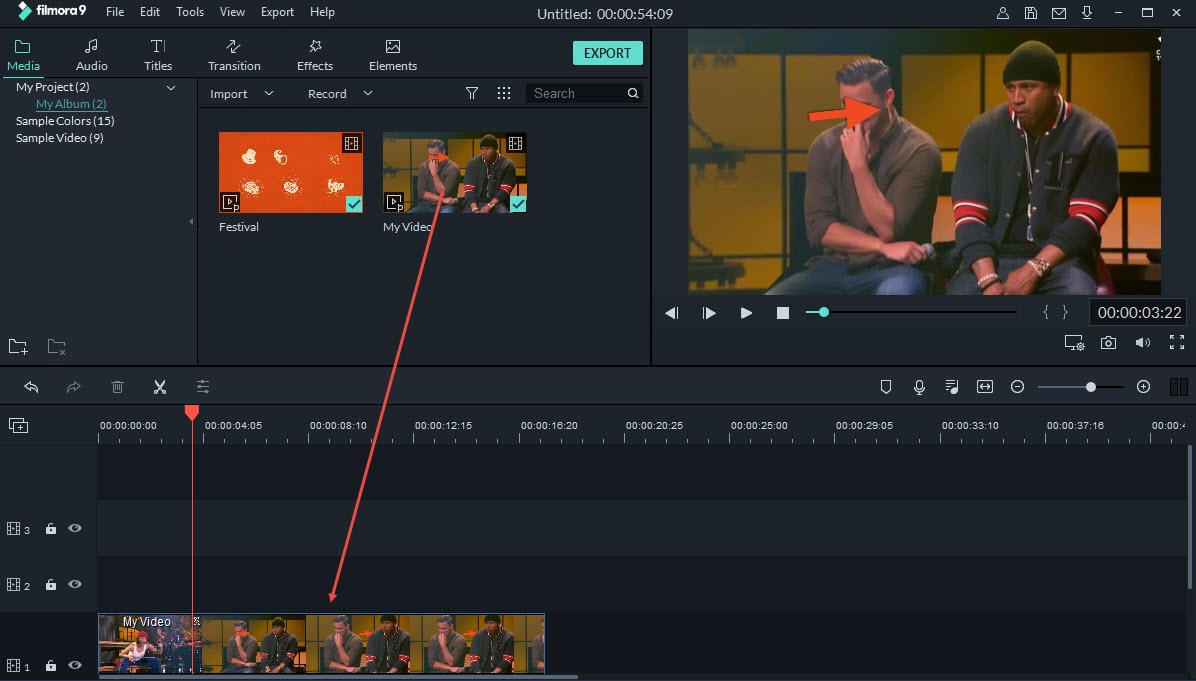
Updated How to Add Audio to Video 3 Creative Ways

How to Add Audio to Video [3 Creative Ways]
The audio or music of video can dramatically affect our perception of a video – no matter whether it’s a home movie, a commercial, or a video presentation. But what if all you have is silent footage or with just a crackled and distorted audio file that needs to be replaced, and at this time, you want to add a sound to the video?
To solve this problem, I humbly recommend Wondershare Filmora . With it, you can easily add audio to video, record the voiceover directly and add it to video, or replace the original audio track (stream) with a new audio file.
In case you want to add music to video with some online tools, please leave a comment below so I can test some online solutions and share with you the best online tools to add audio to video free. I recommend Filmora because its requirement on the network isn’t so high compared to the online tools.
Below is a creative way of adding sound effects to video.
For Win 7 or later (64-bit)
For macOS 10.12 or later
- User-friendly interface enables you to edit your videos easily;
- Supports almost any video and audio formats (including WMV,MOV,FLV,MTS,etc);
- Convenient to add audio to video without quality loss;
- Adding audio to video is so easy
- Supported OS: Windows (Windows 10 included) & Mac OS X (above 10.6).
You May also like 15 Free Music Sites for Commercial Use >>
How to Add Audio to Video Easily
Now see the easy steps to add audio to video files or replace the original audio track with a new voiceover or music.
Step 1: Add audio and video files to the program
After downloading and installing Wondershare Filmora, you can either click Import on the primary windows and select audio and video files from your computer or simply drag and drop audio and video files to the project media library. Filmora also features a free Audio Library, which provides different genres of music and sound effects.
You can preview it and add the proper audio to your video.
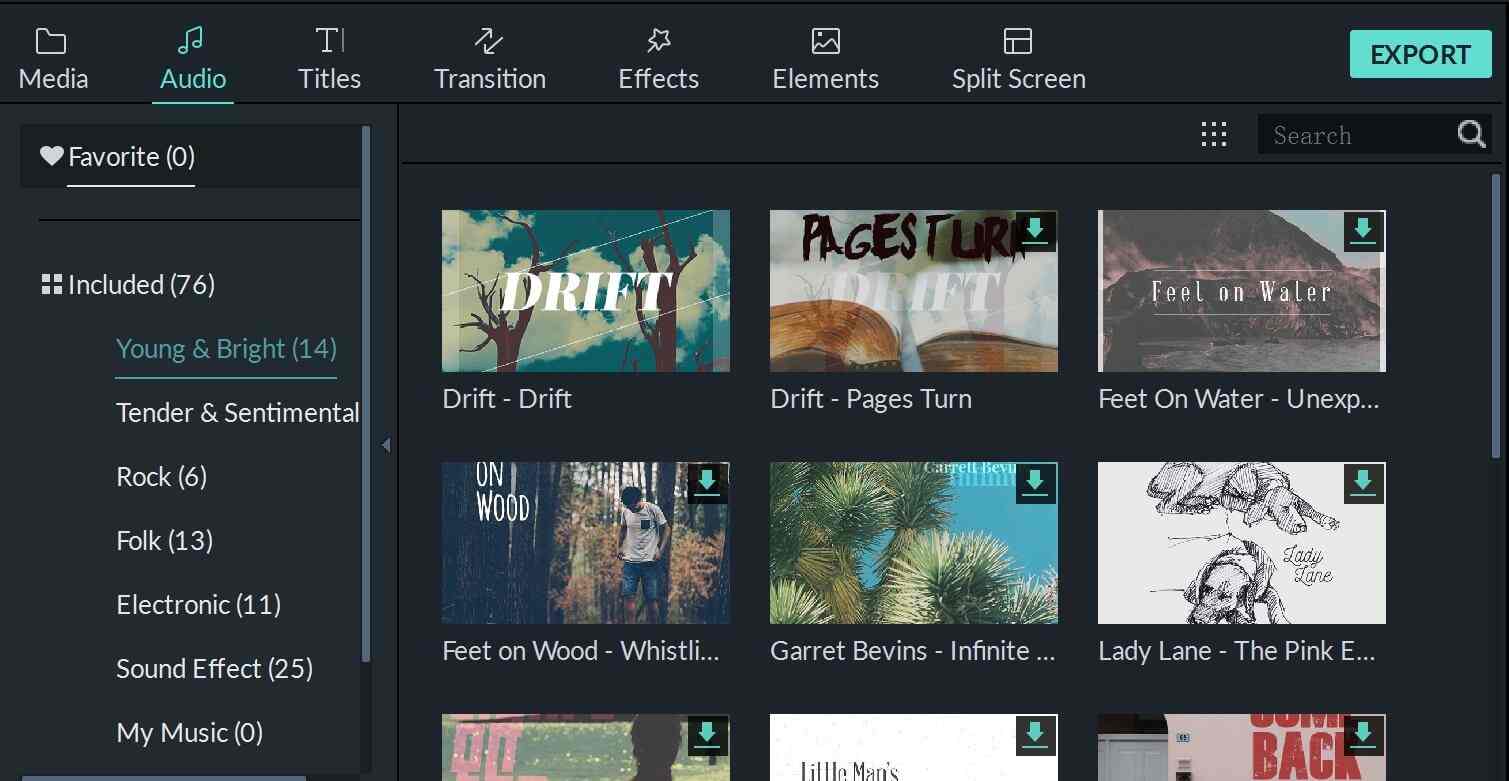
You may also like: 10 Best Free Audio Editor for Windows and Mac
Step 2: Add a new audio file to the video
Drag the audio and video files from the media library or Audio Library and place them on the respective tracks of the timeline, namely, place the audio file to the Audio Track. This way, the audio file(s) will be merged into the video.
Step 3: Record and add your voiceover to video
Instead of adding music to the video , you can also record and add voiceover to the video. It’s a fun way to add narration or complementary audio to video. To do so, click the Record button on the toolbar above timeline, the Record dialog will appear.
Click the red Record button, and you can start to talk in 3 seconds. The voiceover will be added to the User’s Album and timeline when completed.

Step 4: Replace audio track of the video
This is similar to adding audio to video. Just an extra step is required: delete the original audio file. To do so, right-click the video you want to replace audio in it, and select Audio Detach . After that, delete the audio file from the track.
As described above, you can then drag and drop a new audio file from User’s Album to the Audio track.
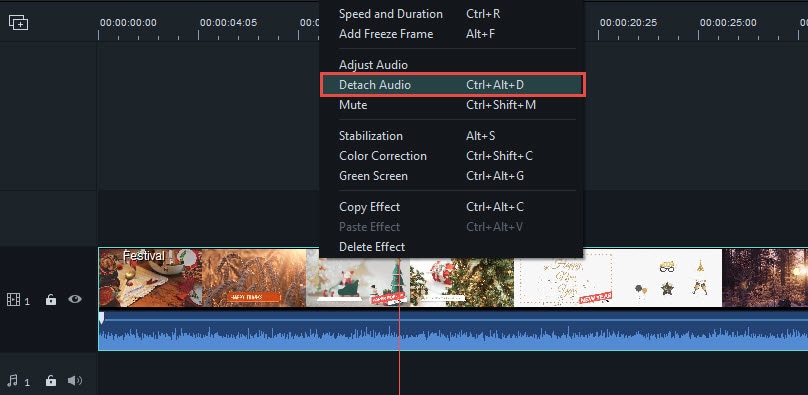
You can click to see more details about How to Replace Audio in Video >>
Step 5: Adjust the audio file and be creative
Various audio editing tools are available: set volume, speed up, slow down, change pitch and add fade in/out effect. Double-click the audio file on the timeline to change the settings and drag the slide bar.
Hit “Return” to confirm the settings and go back to the main interface.
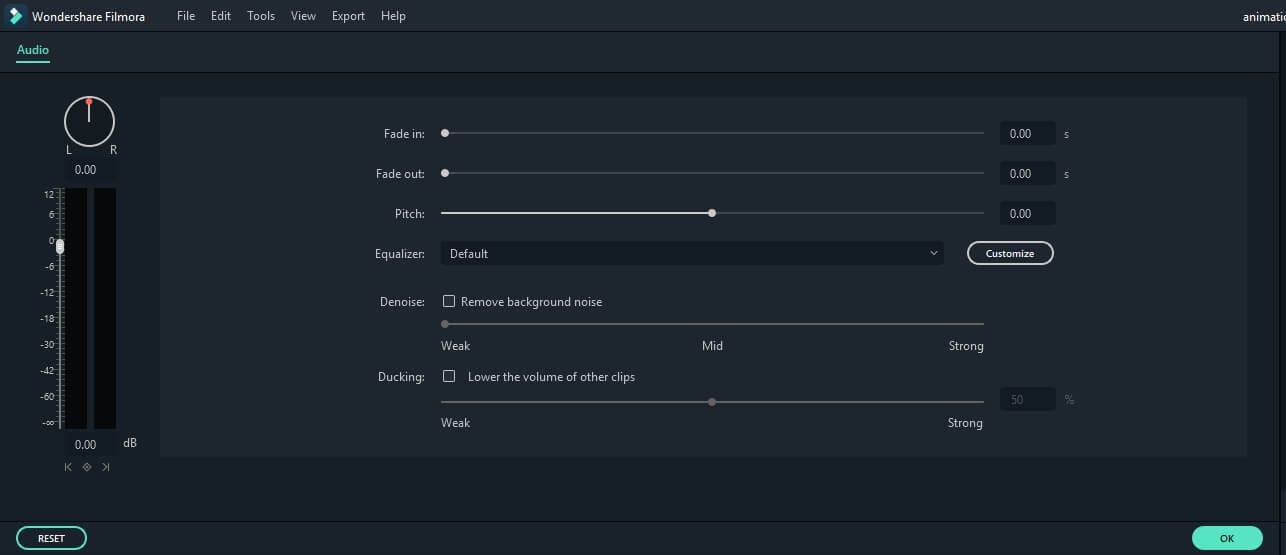
You can also change your voice by adjusting the pitch or speed of the audio file, check the detailed guide about How to change voice with Filmora Voice Changer
Step 6: Export video with new audio track
Click “Create” and select “Format” when all is ready. From the list, choose any format you want as the output format. If necessary, also change the advanced settings. Finally, click the “Create” button to export a new video file to the specified folder on the computer.
Besides export video to your computer, you can also create video for devices like the iPhone, iPad, iPod, directly upload video to YouTube, or burn it to DVD for playing on TV. All in one video editor, no extra software required.
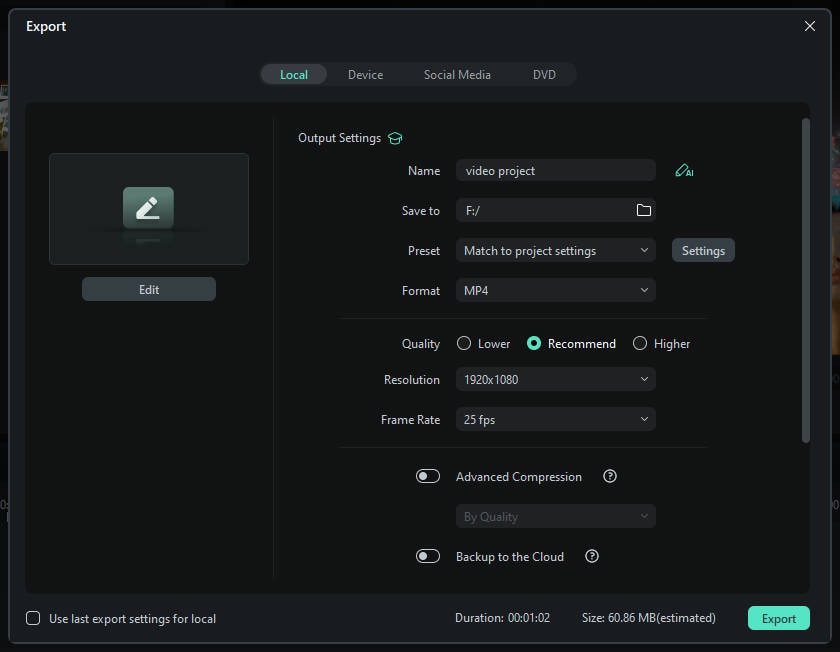
Conclusion
Above are the steps about how to add audio to video with Filmora video editor on Windows and Mac. Typically, you can add your voiceover to the video or detach the original audio and replace it with your voiceover or music file. Whichever you choose, you can adjust the audio settings to get a better result.
For Win 7 or later (64-bit)
For macOS 10.12 or later
For Win 7 or later (64-bit)
For macOS 10.12 or later
- User-friendly interface enables you to edit your videos easily;
- Supports almost any video and audio formats (including WMV,MOV,FLV,MTS,etc);
- Convenient to add audio to video without quality loss;
- Adding audio to video is so easy
- Supported OS: Windows (Windows 10 included) & Mac OS X (above 10.6).
You May also like 15 Free Music Sites for Commercial Use >>
How to Add Audio to Video Easily
Now see the easy steps to add audio to video files or replace the original audio track with a new voiceover or music.
Step 1: Add audio and video files to the program
After downloading and installing Wondershare Filmora, you can either click Import on the primary windows and select audio and video files from your computer or simply drag and drop audio and video files to the project media library. Filmora also features a free Audio Library, which provides different genres of music and sound effects.
You can preview it and add the proper audio to your video.

You may also like: 10 Best Free Audio Editor for Windows and Mac
Step 2: Add a new audio file to the video
Drag the audio and video files from the media library or Audio Library and place them on the respective tracks of the timeline, namely, place the audio file to the Audio Track. This way, the audio file(s) will be merged into the video.
Step 3: Record and add your voiceover to video
Instead of adding music to the video , you can also record and add voiceover to the video. It’s a fun way to add narration or complementary audio to video. To do so, click the Record button on the toolbar above timeline, the Record dialog will appear.
Click the red Record button, and you can start to talk in 3 seconds. The voiceover will be added to the User’s Album and timeline when completed.

Step 4: Replace audio track of the video
This is similar to adding audio to video. Just an extra step is required: delete the original audio file. To do so, right-click the video you want to replace audio in it, and select Audio Detach . After that, delete the audio file from the track.
As described above, you can then drag and drop a new audio file from User’s Album to the Audio track.

You can click to see more details about How to Replace Audio in Video >>
Step 5: Adjust the audio file and be creative
Various audio editing tools are available: set volume, speed up, slow down, change pitch and add fade in/out effect. Double-click the audio file on the timeline to change the settings and drag the slide bar.
Hit “Return” to confirm the settings and go back to the main interface.

You can also change your voice by adjusting the pitch or speed of the audio file, check the detailed guide about How to change voice with Filmora Voice Changer
Step 6: Export video with new audio track
Click “Create” and select “Format” when all is ready. From the list, choose any format you want as the output format. If necessary, also change the advanced settings. Finally, click the “Create” button to export a new video file to the specified folder on the computer.
Besides export video to your computer, you can also create video for devices like the iPhone, iPad, iPod, directly upload video to YouTube, or burn it to DVD for playing on TV. All in one video editor, no extra software required.

Conclusion
Above are the steps about how to add audio to video with Filmora video editor on Windows and Mac. Typically, you can add your voiceover to the video or detach the original audio and replace it with your voiceover or music file. Whichever you choose, you can adjust the audio settings to get a better result.
For Win 7 or later (64-bit)
For macOS 10.12 or later
For Win 7 or later (64-bit)
For macOS 10.12 or later
- User-friendly interface enables you to edit your videos easily;
- Supports almost any video and audio formats (including WMV,MOV,FLV,MTS,etc);
- Convenient to add audio to video without quality loss;
- Adding audio to video is so easy
- Supported OS: Windows (Windows 10 included) & Mac OS X (above 10.6).
You May also like 15 Free Music Sites for Commercial Use >>
How to Add Audio to Video Easily
Now see the easy steps to add audio to video files or replace the original audio track with a new voiceover or music.
Step 1: Add audio and video files to the program
After downloading and installing Wondershare Filmora, you can either click Import on the primary windows and select audio and video files from your computer or simply drag and drop audio and video files to the project media library. Filmora also features a free Audio Library, which provides different genres of music and sound effects.
You can preview it and add the proper audio to your video.

You may also like: 10 Best Free Audio Editor for Windows and Mac
Step 2: Add a new audio file to the video
Drag the audio and video files from the media library or Audio Library and place them on the respective tracks of the timeline, namely, place the audio file to the Audio Track. This way, the audio file(s) will be merged into the video.
Step 3: Record and add your voiceover to video
Instead of adding music to the video , you can also record and add voiceover to the video. It’s a fun way to add narration or complementary audio to video. To do so, click the Record button on the toolbar above timeline, the Record dialog will appear.
Click the red Record button, and you can start to talk in 3 seconds. The voiceover will be added to the User’s Album and timeline when completed.

Step 4: Replace audio track of the video
This is similar to adding audio to video. Just an extra step is required: delete the original audio file. To do so, right-click the video you want to replace audio in it, and select Audio Detach . After that, delete the audio file from the track.
As described above, you can then drag and drop a new audio file from User’s Album to the Audio track.

You can click to see more details about How to Replace Audio in Video >>
Step 5: Adjust the audio file and be creative
Various audio editing tools are available: set volume, speed up, slow down, change pitch and add fade in/out effect. Double-click the audio file on the timeline to change the settings and drag the slide bar.
Hit “Return” to confirm the settings and go back to the main interface.

You can also change your voice by adjusting the pitch or speed of the audio file, check the detailed guide about How to change voice with Filmora Voice Changer
Step 6: Export video with new audio track
Click “Create” and select “Format” when all is ready. From the list, choose any format you want as the output format. If necessary, also change the advanced settings. Finally, click the “Create” button to export a new video file to the specified folder on the computer.
Besides export video to your computer, you can also create video for devices like the iPhone, iPad, iPod, directly upload video to YouTube, or burn it to DVD for playing on TV. All in one video editor, no extra software required.

Conclusion
Above are the steps about how to add audio to video with Filmora video editor on Windows and Mac. Typically, you can add your voiceover to the video or detach the original audio and replace it with your voiceover or music file. Whichever you choose, you can adjust the audio settings to get a better result.
For Win 7 or later (64-bit)
For macOS 10.12 or later
For Win 7 or later (64-bit)
For macOS 10.12 or later
- User-friendly interface enables you to edit your videos easily;
- Supports almost any video and audio formats (including WMV,MOV,FLV,MTS,etc);
- Convenient to add audio to video without quality loss;
- Adding audio to video is so easy
- Supported OS: Windows (Windows 10 included) & Mac OS X (above 10.6).
You May also like 15 Free Music Sites for Commercial Use >>
How to Add Audio to Video Easily
Now see the easy steps to add audio to video files or replace the original audio track with a new voiceover or music.
Step 1: Add audio and video files to the program
After downloading and installing Wondershare Filmora, you can either click Import on the primary windows and select audio and video files from your computer or simply drag and drop audio and video files to the project media library. Filmora also features a free Audio Library, which provides different genres of music and sound effects.
You can preview it and add the proper audio to your video.

You may also like: 10 Best Free Audio Editor for Windows and Mac
Step 2: Add a new audio file to the video
Drag the audio and video files from the media library or Audio Library and place them on the respective tracks of the timeline, namely, place the audio file to the Audio Track. This way, the audio file(s) will be merged into the video.
Step 3: Record and add your voiceover to video
Instead of adding music to the video , you can also record and add voiceover to the video. It’s a fun way to add narration or complementary audio to video. To do so, click the Record button on the toolbar above timeline, the Record dialog will appear.
Click the red Record button, and you can start to talk in 3 seconds. The voiceover will be added to the User’s Album and timeline when completed.

Step 4: Replace audio track of the video
This is similar to adding audio to video. Just an extra step is required: delete the original audio file. To do so, right-click the video you want to replace audio in it, and select Audio Detach . After that, delete the audio file from the track.
As described above, you can then drag and drop a new audio file from User’s Album to the Audio track.

You can click to see more details about How to Replace Audio in Video >>
Step 5: Adjust the audio file and be creative
Various audio editing tools are available: set volume, speed up, slow down, change pitch and add fade in/out effect. Double-click the audio file on the timeline to change the settings and drag the slide bar.
Hit “Return” to confirm the settings and go back to the main interface.

You can also change your voice by adjusting the pitch or speed of the audio file, check the detailed guide about How to change voice with Filmora Voice Changer
Step 6: Export video with new audio track
Click “Create” and select “Format” when all is ready. From the list, choose any format you want as the output format. If necessary, also change the advanced settings. Finally, click the “Create” button to export a new video file to the specified folder on the computer.
Besides export video to your computer, you can also create video for devices like the iPhone, iPad, iPod, directly upload video to YouTube, or burn it to DVD for playing on TV. All in one video editor, no extra software required.

Conclusion
Above are the steps about how to add audio to video with Filmora video editor on Windows and Mac. Typically, you can add your voiceover to the video or detach the original audio and replace it with your voiceover or music file. Whichever you choose, you can adjust the audio settings to get a better result.
For Win 7 or later (64-bit)
For macOS 10.12 or later
Mastering Silence: Seamless Audio Cutting in Adobe Premiere Pro
It is impossible to eliminate background noises from the environment we shoot in. However, you can always remove them from recordings using different tools. These tools analyze the audio waves and detect unwanted noises for removal. They use spectral separation, filtering, and other adjustments to fine-tune audio. Some tools like noise reduction in Premiere Pro offer audio enhancements afterward.
In this article, the center of the discussion is background noise remove Premiere Pro. It is a professional video editor offering multiple functionalities with AI support. Besides Premiere Pro background noise reduction, users will find some other tools. Most of these tools use web and internet support to carry out the process. In the end, users will discover a desktop alternative to Premiere Pro for noise removal.
AI Noise Reducer A cross-platform for facilitating your video editing process by offering valuable benefits!
Free Download Free Download Learn More
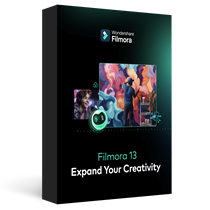
Part 1: What Are the Potential Benefits of Using Noise Reduction Tools for Video Editing?
There are a handful of advantages of using noise reduction tools for video editing. These tools, including noise reduction Adobe Premiere, elevate overall video. The removal of unnecessary voices and noise brings clarity to the content. Viewers can focus on what is important instead of being irritated by noise. There are many potential benefits of noise removal tools discussed as follows:
1. Refined Audio Quality
Once you listen to a video after recording, you realize the number of unwanted noises. Such noises can irritate viewers and may decrease your content’s worth. Using noise reduction tools will assist you in dealing with such issues. You can remove unwanted audio elements like hisses, hums, or background voices. Reducing insignificant sounds will ultimately elevate the original sound quality.
2. Builds Production Value
One of the indications of high-quality content or production is its ability to manage audio. Audio management like background, wind, and hum removal counts in productions. Hence, employing such tools contributes to higher production value. They help in clarifying audio, which helps with increased audience engagement.
3. Maintains Audience Engagement
In today’s fast-paced lifestyle, hooking an audience to the screen is a fundamental task. One of the ways to achieve it is through high-quality sound. A professional video creator removes the unwanted yet distracting noises from videos. Even in outdoor shoots, using such tools can enhance the maximum sound damage. This extraction of background sounds maintains the audience’s attention and engages them.
4. Consistency Throughout the Scenes
In videos at a larger scale, combining multiple clips can cause noise havoc. Using these noise reduction tools for the overall film or separate clips brings consistency. This way, they retain the audio quality and engagement through the videos.
5. Creativity and Accessibility
Using background noise removal tools can increase the chance of creativity. A high-quality video sound without distracting noises is easy to edit. In addition, users can apply different audio drive effects to elevate content. Moreover, enhanced audio quality enhances the content reach and comprehension. It helps those who rely on something other than subtitles to understand dialogues.
Part 2: Reducing or Removing Background Noise in Premiere Pro: A Guide
Who isn’t familiar with noise reduction Adobe Premiere Pro, a professional editor? It serves as both video and audio editing software with AI abilities. Creators can bring precision to their content using its editing and trimming tools. The software assists in upgrading video visuals via transitions, effects, and titles. With its custom features, you can infuse your videos with your unique style.
Amongst its multifunctionalities, one is the Premiere Pro audio noise reduction. It is about making a few right clicks in Adobe to achieve audio clarity. Users can boost the audio by reducing unwanted and distractive sounds. It helps sharpen elements like dialogues, music, sound effects, and ambiance. Moreover, you can add depth to audio using the Reverb option and control everything.
Different Ways To Remove Background Noise in Premiere Pro
Adobe Premiere Pro is a versatile tool to denoise audio in multiple scenarios. This section emphasizes general noise reduction and some specific ones. Users can follow the step-by-step guides below to denoise audio Premiere Pro:
1. Reduce Noise
Employing noise reduction in Premiere Pro will eliminate the overall background noises. This will elevate the overall audio quality of your video. Here are the steps to perform noise reduction in Adobe Premiere Pro:
Step 1: After importing your unedited video in Adobe, navigate towards the top toolbar. From the many options there, locate and select the “Audio” option.

Step 2: An “Essential Sound” panel will appear on the right side of the preview section. From the four major audio elements appearing on this panel, select “Dialogue.”

Step 3: Further, go to the “Edit” tab, and under the “Repair” section, enable the box for “Reduce Noise.” Then, change the position of this slider to the right for maximized results. It is advised that you should not move the slider towards the right, as it can distort your own voice. Keep the slider between somewhere in the middle.

2. Reduce Rumble
When shooting outdoors, it is not uncommon to face high wind noise. This sound can be both distracting and annoying. So, if you want to free your audio of wind noise, follow the given steps:
Step 1: Upon importing the media with wind noise, move towards the upper tool panel. Select the clip in the timeline, which will feature a settings panel at the right.

Step 2: Navigate towards the right-side panel using your cursor and select the “Dialogue” option.

Step 3: Then select the “Edit” tab and locate the “Repair” segment under it. In there, enable the “Reduce Rumble” option. Then, adjust the position of its slider according to your preference.

3. Reduce Reverb
Recording in some places can cause an echo in your voice, but Premiere Pro can manage it. It has the Reverb option to manage the depth of your voice. Follow the steps given below to remove noise Premiere:
Instruction: Under the “Edit > Repair” tab, trace and activate the “Reduce Reverb” option. Further, experiment with the position of the reverb slider to adjust it.

4. Enhance Vocals
Employing any of the above actions may impact the vocal quality in videos. However, noise Premiere Pro gives you the option to adjust that as well. The next section discusses the step-by-step guide to enhance vocals:
Step 1: After setting the above options, scroll down into the “Edit” tab in the right panel. Locate and activate the “Clarity” option and adjust its slider.

Step 2: Then move towards the “Preset” section and click on the Downward Arrow icon. From the dropdown menu, choose the “Vocal Presence” option. You can also choose the “Podcast” voice to bring back vocal clarity.

Step 3: Below the “Preset” section, locate and enable the “Enhance Speech” option. Further, you can select between “High Tone” and “Low Tone” options.

5. Manual Audio Effects
An alternative method to remove audio noise in Premiere Pro is to use audio effects. These effects will improve the clarity of content to make it engaging. If you choose to use this method, here are the steps for you to follow:
Step 1: Select your media in the timeline, and from the left side of the window, locate and select “Effects.”

Step 2: In the search bar, add the name of the specific effect you are looking for. You can look for denoise, reverb, and other options. For instance, you have searched and selected the “Denoise” effect.

Step 3: Navigate towards the “Effects Control Center” and go to the “Denoise” section. Then, select the “Edit” button in this section.

Step 4: From the new window, expand the “Preset” option and choose from high or low settings. You can also play with the slider’s position to adjust it. In a similar way, you can add as many audio effects as possible and adjust their settings.

Part 3: Other Noise Reduction Tools You Can Look Out For (Online)
Although we discussed noise reduction in Premiere Pro, it can be confusing for some. It is understandable as it was designed to assist professionals. Locating and adjusting effects in its extensive editing interface can be difficult. This section mentions some online alternatives for removing noise in Premiere Pro:
1. Media.io
Media.io is a versatile tool and a substitute to reduce audio noise Premiere Pro. It has a clear-cut user interface that only requires you to upload the video. The tool uses AI assistance to remove noise from your music videos, vlogs, and more. It can remove 6 types of background noises and has a built-in audio enhancer. It covers denoise, speech enhancement, wind, reverb, hiss, and click noise.
Moreover, Media.io supports diverse audio formats, including MP3, MOV, and more. It is compatible across a wide range of devices and ensures synchronized working. Users can access it anywhere, on any device, and denoise audio with security. The AI-backed technology performs noise reduction from videos rapidly.
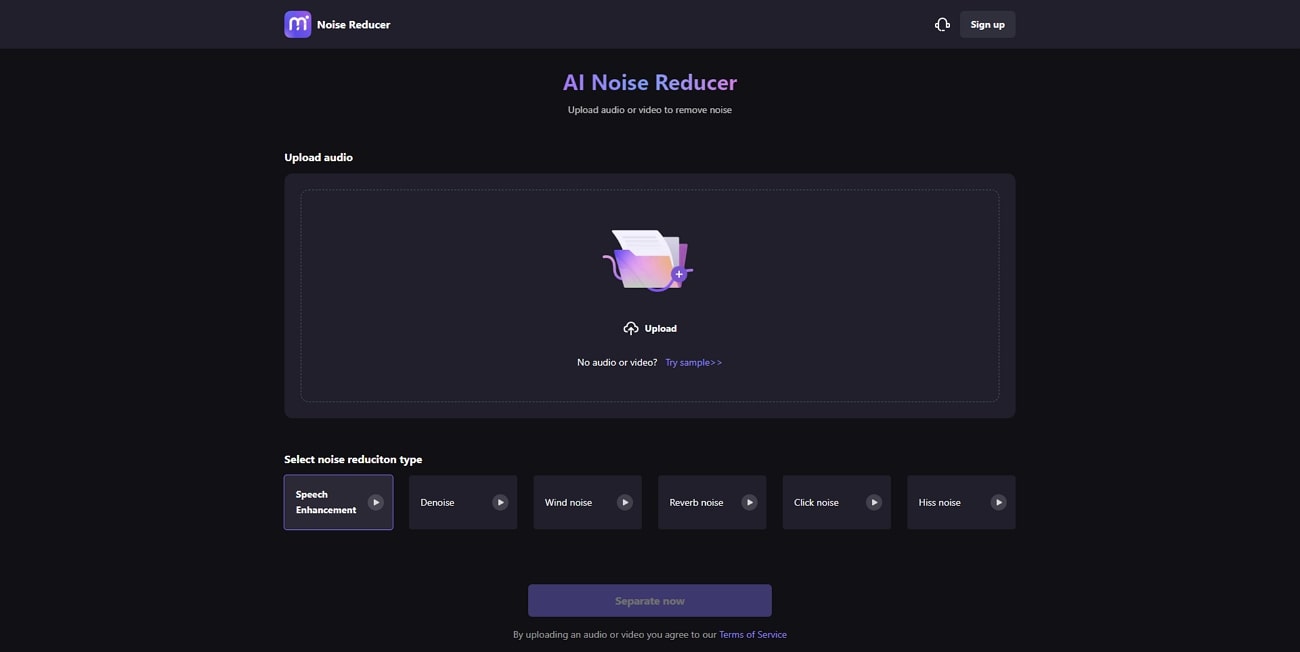
2. Kapwing
Does noise reduction in Premiere Pro feel like too much of a learning curve? We have brought another alternative with a minimal yet modern editing interface. The tool has AI-backed algorithms to remove background noise with precision. The AI detects and eliminates unnecessary sounds and enhances vocals. Its noise-reducer AI is free to use and only requires you to log in.
After enhancing your video’s audio, you can edit it afterward with Kapwing’s built-in resources. The fact that it operates online helps you to access it from anywhere. With its synchronization option, you can experience a streamlined workflow.

3. VEED.io
Noise reduction in Premiere Pro was manual, but this AI noise remover speeds up the task. If you must clean up noise from a voiceover or podcast, this is the tool. In addition to removing noise, you can embed music within this tool. The AI can detect wind, rain, traffic, clock ticking, and humming noises.
Moreover, you can enhance the audio quality of your Zoom and other recording by removing noise from such recorders. The tool supports all popular media formats like MP4, MOV, and more. Editing videos afterward, like adding effects or trimming in VEED.io, is an option.

4. Podcastle AI
This is another easy-to-access alternative to removing noise Adobe Premiere. It can auto-eliminate those background conversations and static noises. With this tool’s existence, record your videos without worrying about noise. You can also record voiceover within this tool and remove background noise.
In addition, the tool has built-in audio and video editing features and enhancements. Upon removing noise, you can use its effects and animations to uplift the video.

Bonus Part: Controlling the Vocals with A Fine-Tuned Video Editor: Wondershare Filmora 13
With the increasing trend of vlogs and blogs, creator’s attention shifted to such tools. Removing background noise can sometimes result in decreased vocal quality. For audio clarity through denoising and enhancing, you can use Wondershare Filmora . This is an AI-driven desktop alternative to noise reduction in Premiere Pro. Filmora is a reliable tool for enhancing both your video and audio content.
Free Download For Win 7 or later(64-bit)
Free Download For macOS 10.14 or later
It has AI-backed algorithms that keep updating according to modern needs. Recently, Filmora has launched its V13 version for efficient editing. The software can assist through text-based video editing and copilot editing. In addition to these, it introduced the AI Vocal Remover tool as an audio editing aid. Users can employ this feature to separate their vocals and background noises.
One of the applications of this tool is to assist in removing vocals from songs. Removing vocals doesn’t damage the quality of the audio. This helps you with inserting vocals as voiceovers for tutorial or explainer videos.
Steps to Employ AI Vocal Remover Tool
Since maintaining vocals is an important part of video content, Filmora offers it. Its AI vocal remover is amongst the leading tools in the market. You do not need to waste hours on understanding it since we have its user guide here:
Step 1: Initiate Filmora and Import Media
Upon downloading Filmora’s latest version from its website, launch it. Once you access its main display, click the “New Project” button. Upon entering its editing interface, click “Import” to import files. Then, use the drag-and-drop technique to bring them to the timeline.

Step 2: Access the Vocal Remover Tool
Now, select the video you added to the timeline and right-click on it. From the options panel appears, locate and select the “AI Vocal Remover” option. This will feature the AI Vocal Remover pop-up on the screen and show progress.

Step 3: Export the Vocals
Once the process is completed, you’ll see two different audios in the timeline. One is the background audio, and the other is your video’s vocals. You can export the vocals by clicking the “Export” button in Filmora. Afterward, you can use them as a voiceover for your videos, vlog, or blogs.

Conclusion
In conclusion, you are now aware of noise reduction in Premiere Pro and its features. The article shed light on different methods of removing background noise in it. It familiarized readers with some online alternatives to Adobe Premiere Pro. As a final point, we discussed a professional and multifunctional desktop tool.
Wondershare Filmora has all the options to denoise audio or save a video’s vocals. Its AI-backed features boost the productivity of editors and creators. The more you use it, the more you discover about this amazing editor. For more information, you can visit its official site and download it to explore.
Free Download For Win 7 or later(64-bit)
Free Download For macOS 10.14 or later
Free Download Free Download Learn More

Part 1: What Are the Potential Benefits of Using Noise Reduction Tools for Video Editing?
There are a handful of advantages of using noise reduction tools for video editing. These tools, including noise reduction Adobe Premiere, elevate overall video. The removal of unnecessary voices and noise brings clarity to the content. Viewers can focus on what is important instead of being irritated by noise. There are many potential benefits of noise removal tools discussed as follows:
1. Refined Audio Quality
Once you listen to a video after recording, you realize the number of unwanted noises. Such noises can irritate viewers and may decrease your content’s worth. Using noise reduction tools will assist you in dealing with such issues. You can remove unwanted audio elements like hisses, hums, or background voices. Reducing insignificant sounds will ultimately elevate the original sound quality.
2. Builds Production Value
One of the indications of high-quality content or production is its ability to manage audio. Audio management like background, wind, and hum removal counts in productions. Hence, employing such tools contributes to higher production value. They help in clarifying audio, which helps with increased audience engagement.
3. Maintains Audience Engagement
In today’s fast-paced lifestyle, hooking an audience to the screen is a fundamental task. One of the ways to achieve it is through high-quality sound. A professional video creator removes the unwanted yet distracting noises from videos. Even in outdoor shoots, using such tools can enhance the maximum sound damage. This extraction of background sounds maintains the audience’s attention and engages them.
4. Consistency Throughout the Scenes
In videos at a larger scale, combining multiple clips can cause noise havoc. Using these noise reduction tools for the overall film or separate clips brings consistency. This way, they retain the audio quality and engagement through the videos.
5. Creativity and Accessibility
Using background noise removal tools can increase the chance of creativity. A high-quality video sound without distracting noises is easy to edit. In addition, users can apply different audio drive effects to elevate content. Moreover, enhanced audio quality enhances the content reach and comprehension. It helps those who rely on something other than subtitles to understand dialogues.
Part 2: Reducing or Removing Background Noise in Premiere Pro: A Guide
Who isn’t familiar with noise reduction Adobe Premiere Pro, a professional editor? It serves as both video and audio editing software with AI abilities. Creators can bring precision to their content using its editing and trimming tools. The software assists in upgrading video visuals via transitions, effects, and titles. With its custom features, you can infuse your videos with your unique style.
Amongst its multifunctionalities, one is the Premiere Pro audio noise reduction. It is about making a few right clicks in Adobe to achieve audio clarity. Users can boost the audio by reducing unwanted and distractive sounds. It helps sharpen elements like dialogues, music, sound effects, and ambiance. Moreover, you can add depth to audio using the Reverb option and control everything.
Different Ways To Remove Background Noise in Premiere Pro
Adobe Premiere Pro is a versatile tool to denoise audio in multiple scenarios. This section emphasizes general noise reduction and some specific ones. Users can follow the step-by-step guides below to denoise audio Premiere Pro:
1. Reduce Noise
Employing noise reduction in Premiere Pro will eliminate the overall background noises. This will elevate the overall audio quality of your video. Here are the steps to perform noise reduction in Adobe Premiere Pro:
Step 1: After importing your unedited video in Adobe, navigate towards the top toolbar. From the many options there, locate and select the “Audio” option.

Step 2: An “Essential Sound” panel will appear on the right side of the preview section. From the four major audio elements appearing on this panel, select “Dialogue.”

Step 3: Further, go to the “Edit” tab, and under the “Repair” section, enable the box for “Reduce Noise.” Then, change the position of this slider to the right for maximized results. It is advised that you should not move the slider towards the right, as it can distort your own voice. Keep the slider between somewhere in the middle.

2. Reduce Rumble
When shooting outdoors, it is not uncommon to face high wind noise. This sound can be both distracting and annoying. So, if you want to free your audio of wind noise, follow the given steps:
Step 1: Upon importing the media with wind noise, move towards the upper tool panel. Select the clip in the timeline, which will feature a settings panel at the right.

Step 2: Navigate towards the right-side panel using your cursor and select the “Dialogue” option.

Step 3: Then select the “Edit” tab and locate the “Repair” segment under it. In there, enable the “Reduce Rumble” option. Then, adjust the position of its slider according to your preference.

3. Reduce Reverb
Recording in some places can cause an echo in your voice, but Premiere Pro can manage it. It has the Reverb option to manage the depth of your voice. Follow the steps given below to remove noise Premiere:
Instruction: Under the “Edit > Repair” tab, trace and activate the “Reduce Reverb” option. Further, experiment with the position of the reverb slider to adjust it.

4. Enhance Vocals
Employing any of the above actions may impact the vocal quality in videos. However, noise Premiere Pro gives you the option to adjust that as well. The next section discusses the step-by-step guide to enhance vocals:
Step 1: After setting the above options, scroll down into the “Edit” tab in the right panel. Locate and activate the “Clarity” option and adjust its slider.

Step 2: Then move towards the “Preset” section and click on the Downward Arrow icon. From the dropdown menu, choose the “Vocal Presence” option. You can also choose the “Podcast” voice to bring back vocal clarity.

Step 3: Below the “Preset” section, locate and enable the “Enhance Speech” option. Further, you can select between “High Tone” and “Low Tone” options.

5. Manual Audio Effects
An alternative method to remove audio noise in Premiere Pro is to use audio effects. These effects will improve the clarity of content to make it engaging. If you choose to use this method, here are the steps for you to follow:
Step 1: Select your media in the timeline, and from the left side of the window, locate and select “Effects.”

Step 2: In the search bar, add the name of the specific effect you are looking for. You can look for denoise, reverb, and other options. For instance, you have searched and selected the “Denoise” effect.

Step 3: Navigate towards the “Effects Control Center” and go to the “Denoise” section. Then, select the “Edit” button in this section.

Step 4: From the new window, expand the “Preset” option and choose from high or low settings. You can also play with the slider’s position to adjust it. In a similar way, you can add as many audio effects as possible and adjust their settings.

Part 3: Other Noise Reduction Tools You Can Look Out For (Online)
Although we discussed noise reduction in Premiere Pro, it can be confusing for some. It is understandable as it was designed to assist professionals. Locating and adjusting effects in its extensive editing interface can be difficult. This section mentions some online alternatives for removing noise in Premiere Pro:
1. Media.io
Media.io is a versatile tool and a substitute to reduce audio noise Premiere Pro. It has a clear-cut user interface that only requires you to upload the video. The tool uses AI assistance to remove noise from your music videos, vlogs, and more. It can remove 6 types of background noises and has a built-in audio enhancer. It covers denoise, speech enhancement, wind, reverb, hiss, and click noise.
Moreover, Media.io supports diverse audio formats, including MP3, MOV, and more. It is compatible across a wide range of devices and ensures synchronized working. Users can access it anywhere, on any device, and denoise audio with security. The AI-backed technology performs noise reduction from videos rapidly.

2. Kapwing
Does noise reduction in Premiere Pro feel like too much of a learning curve? We have brought another alternative with a minimal yet modern editing interface. The tool has AI-backed algorithms to remove background noise with precision. The AI detects and eliminates unnecessary sounds and enhances vocals. Its noise-reducer AI is free to use and only requires you to log in.
After enhancing your video’s audio, you can edit it afterward with Kapwing’s built-in resources. The fact that it operates online helps you to access it from anywhere. With its synchronization option, you can experience a streamlined workflow.

3. VEED.io
Noise reduction in Premiere Pro was manual, but this AI noise remover speeds up the task. If you must clean up noise from a voiceover or podcast, this is the tool. In addition to removing noise, you can embed music within this tool. The AI can detect wind, rain, traffic, clock ticking, and humming noises.
Moreover, you can enhance the audio quality of your Zoom and other recording by removing noise from such recorders. The tool supports all popular media formats like MP4, MOV, and more. Editing videos afterward, like adding effects or trimming in VEED.io, is an option.

4. Podcastle AI
This is another easy-to-access alternative to removing noise Adobe Premiere. It can auto-eliminate those background conversations and static noises. With this tool’s existence, record your videos without worrying about noise. You can also record voiceover within this tool and remove background noise.
In addition, the tool has built-in audio and video editing features and enhancements. Upon removing noise, you can use its effects and animations to uplift the video.

Bonus Part: Controlling the Vocals with A Fine-Tuned Video Editor: Wondershare Filmora 13
With the increasing trend of vlogs and blogs, creator’s attention shifted to such tools. Removing background noise can sometimes result in decreased vocal quality. For audio clarity through denoising and enhancing, you can use Wondershare Filmora . This is an AI-driven desktop alternative to noise reduction in Premiere Pro. Filmora is a reliable tool for enhancing both your video and audio content.
Free Download For Win 7 or later(64-bit)
Free Download For macOS 10.14 or later
It has AI-backed algorithms that keep updating according to modern needs. Recently, Filmora has launched its V13 version for efficient editing. The software can assist through text-based video editing and copilot editing. In addition to these, it introduced the AI Vocal Remover tool as an audio editing aid. Users can employ this feature to separate their vocals and background noises.
One of the applications of this tool is to assist in removing vocals from songs. Removing vocals doesn’t damage the quality of the audio. This helps you with inserting vocals as voiceovers for tutorial or explainer videos.
Steps to Employ AI Vocal Remover Tool
Since maintaining vocals is an important part of video content, Filmora offers it. Its AI vocal remover is amongst the leading tools in the market. You do not need to waste hours on understanding it since we have its user guide here:
Step 1: Initiate Filmora and Import Media
Upon downloading Filmora’s latest version from its website, launch it. Once you access its main display, click the “New Project” button. Upon entering its editing interface, click “Import” to import files. Then, use the drag-and-drop technique to bring them to the timeline.

Step 2: Access the Vocal Remover Tool
Now, select the video you added to the timeline and right-click on it. From the options panel appears, locate and select the “AI Vocal Remover” option. This will feature the AI Vocal Remover pop-up on the screen and show progress.

Step 3: Export the Vocals
Once the process is completed, you’ll see two different audios in the timeline. One is the background audio, and the other is your video’s vocals. You can export the vocals by clicking the “Export” button in Filmora. Afterward, you can use them as a voiceover for your videos, vlog, or blogs.

Conclusion
In conclusion, you are now aware of noise reduction in Premiere Pro and its features. The article shed light on different methods of removing background noise in it. It familiarized readers with some online alternatives to Adobe Premiere Pro. As a final point, we discussed a professional and multifunctional desktop tool.
Wondershare Filmora has all the options to denoise audio or save a video’s vocals. Its AI-backed features boost the productivity of editors and creators. The more you use it, the more you discover about this amazing editor. For more information, you can visit its official site and download it to explore.
Free Download For Win 7 or later(64-bit)
Free Download For macOS 10.14 or later
Also read:
- [New] The Ultimate Guide to Proficiently Navigating Win 10
- [Updated] 2024 Approved The Dynamic World of Digital Gifts A Complete Guide to Snapchat Gifs
- [Updated] 2024 Approved Top 6 Essential Lite Videos Downloader Apps for Facebook
- [Updated] From Novice to Pro How to Evade the Most Critical 8 Mistakes on YouTube for 2024
- [Updated] In 2024, Expertly Design Your 3D Openers Best Picks
- 2024 Approved Shutter Snappiness Harnessing Edits for Great Photos
- Choosing Your Smart Companion: In-Depth Analysis of Apple Watch S9 and Fitbit Charge 6
- In 2024, Audiovisual Integration Incorporating Audio Waveform and Creative Animation Into DaVinci Resolve
- In 2024, Top 10 Safe Chat Platforms for Socializing Digitally
- Navigating the Synergy Between Soundtracks and Photographic Frames for 2024
- New Clearing the Air Understanding Digital Audio Workstations
- New Conquering Complex Audioscapes A No-Nonsense Guide to Effective Track Combination in Premiere Pro for 2024
- New Crafting the Ultimate Strum A Comprehensive Look at the Top 7 DAWs Designed for Guitar Recordings
- New Mastering the Art of Flawless Podcast Production Your Comprehensive Tutorial for 2024
- New Premier Pop Song Selections for Film and Media Production for 2024
- New The Art of Gamers Vocal Disguise Selecting the Ultimate Toolkit
- Not Yet on Board with the Upcoming ChatGPT Desktop? Opt for This Incredible Free Alternative Now.
- Optimizing TikTok Content: Understanding Format Options and Video Duration Rules
- Tom's Tech Reviews: In-Depth Computer Hardware Insights
- Title: Updated How to Add Audio to Video 3 Creative Ways
- Author: Paul
- Created at : 2024-10-12 20:40:59
- Updated at : 2024-10-18 09:14:20
- Link: https://voice-adjusting.techidaily.com/updated-how-to-add-audio-to-video-3-creative-ways/
- License: This work is licensed under CC BY-NC-SA 4.0.
